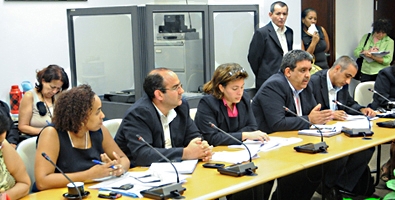aNewDomain.net — Until last January, Cuba’s connection to the Internet was over slow, expensive satellite links. As we reported earlier, an undersea cable connecting Cuba with Venezuela was turned on in January and earlier this month a link to Jamaica was completed.
Cuba is now moving to improve access to that international connectivity. Etecsa, the Cuban ISP, will open 118 new public access facilities on June 4th.
Pricing will be as follows:
- Domestic browsing and email $.60/hour
- International email plus domestic navigation $1.50/hour
- International browsing and email $4.50/hour
That is world-class expensive, but cheaper than their preivous rates. It remains unreachable for the average Cuban. The New York Times quoted Osvald Ulloa as saying “It’s a real bargain … I work for a week and then I can get online for hour — fabulous.”
Etecsa officials gave some details and made some promises at a press conference announcing the new centers. They promised still lower prices, more access centers, WiFi in access centers, mobile connectivity, etc., but did not give specifics.
They did give some specifics about the service that will be offered at the new centers on June 4. The connection speed will be “up to” two megabits per second, depending upon the available infrastructure at each location. All Web services will be available — chat, social networks, email, uploading and downloading of files, etc. (No one asked about surveillance).
However, VOIP calls will be prohibited in accordance with Resolution 120/2003 of the Telecommunications Company of Cuba. I wonder whether “click to talk” services on Web sites will work. The VOIP restriction protects Etecsa revenue for now, but it may turn out to be difficult to enforce.
The slow connection speed — up to 2 mbps — reflects the remark of Jorge Luis Legros, Director of Etecsa Strategic Programs, when asked about the impact of the undersea cable. He said that it will improve service but “investments in networks and systems to bring access closer to the end user are needed.”
That is the rub. Cuba’s domestic infrastructure is very poor. Those undersea cable links are strong links in a very weak chain.
China was instrumental in financing the undersea cable, but what about the domestic infrastructure Mr. Legros referred to? Will China invest in that? Will any others invest in Cuban infrastructure given the current political and economic policies?














